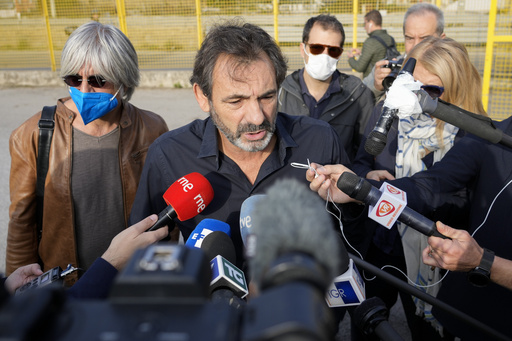
MILAN — Italy’s Deputy Premier, Matteo Salvini, is maintaining a bold stance as he awaits a court ruling in Sicily regarding his actions in 2019 when he denied entry to around 100 migrants aboard a humanitarian rescue vessel. As the former Interior Minister, Salvini stands accused of illegally detaining migrants onboard the Open Arms ship, notably during a tense period in which they were kept waiting off the coast of Lampedusa.
At a rally last week, Salvini, who heads the Euroskeptic and anti-immigration League party, asserted that “defending the borders, the dignity, the laws, the honor of a country cannot ever be a crime.” He plans to enter the courtroom in Palermo with confidence as he anticipates the verdict on his alleged misconduct in relation to the migrants, which includes a failure to uphold his public duties. The prosecution has recommended a prison sentence of six years, and if he receives a sentence of more than five years, it would result in an automatic disqualification from holding public office. However, any verdict delivered on Friday will not be immediately actionable, as it will be subject to two levels of appeal, a process that could extend over multiple years. Salvini has also asserted that he has no intentions of resigning regardless of the outcome.
In August 2019, the Open Arms approached Italian waters with 150 migrants onboard—some having been rescued from the Maltese search-and-rescue area—with Lampedusa being the nearest accessible port. The migrants faced a dire situation, with ten days spent in international waters followed by five days in the vicinity of Lampedusa. Tensions escalated among those aboard due to worsening sanitary conditions, prompting some to attempt to jump overboard and necessitating the evacuation of minors during this standoff. Ultimately, a court ruling mandated the disembarkation of the remaining 89 migrants on Lampedusa.
Arturo Salerni, the attorney representing Open Arms in this case, refuted Salvini’s assertions about protecting Italy’s borders, emphasizing the duty of public officials to safeguard the rights of individuals in distress. “The supreme duty, especially of those who belong to governments, is to defend international laws and conventions, and people’s rights,” Salerni stated, insisting that no minister has the authority to deprive individuals of their freedom.
The situation involving Open Arms was just one among over 20 similar incidents during Salvini’s stringent anti-migration policies when he served as the Interior Minister from 2018 to 2019 under the first government of former Premier Giuseppe Conte. During that time, he instituted a ban on entry for humanitarian rescue vessels, arguing that these operations perpetuated human smuggling.
In another notable case, German captain Carola Rackete faced arrest after she defied Salvini’s directives by entering Lampedusa’s port in June 2019 with her ship, the Sea-Watch 3, after declaring an emergency—having been at sea for 16 days with 40 rescued migrants onboard. Ultimately, Italy dropped the charges against her relating to aiding illegal immigration.
Presently, serving as the Transport Minister in the far-right government led by Premier Giorgia Meloni, Salvini enjoys the backing of the Prime Minister and fellow ministers amidst the ongoing trial in Palermo. He also garnered support from anti-migrant politicians across Europe, who showed solidarity by wearing T-shirts emblazoned with his image and the phrase “Guilty for having defended Italy” during a recent assembly in Brussels.
Since the 2022 change in government, Meloni has taken steps to further tighten migration controls, negotiating agreements with North African countries to curb migrant departures, and establishing centers in Albania designed to screen migrants rescued at sea outside of Italian territory. During a speech to the Italian Senate, Meloni declared, “Salvini gets the solidarity of the entire government,” prompting a standing ovation from right-wing lawmakers.
